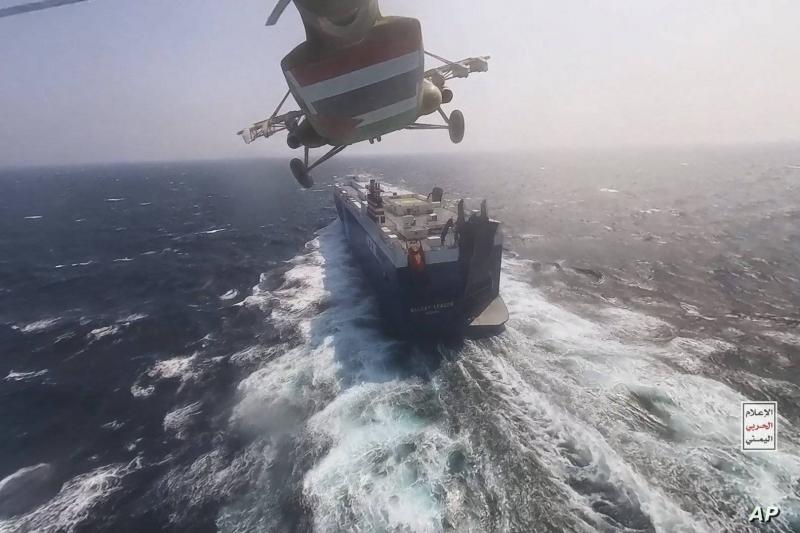Pressure is mounting on President Joe Biden’s administration to respond to Iran and its allies, including the Houthis, to halt attacks in the Red Sea. Biden's opponents are warning against a lack of firm action regarding Iranian threats and the implications for global maritime security. The British newspaper "The Guardian" warned that the deterioration could reach a stage where preventing the expansion of regional war becomes difficult, given the threat to maritime navigation near Yemen, alongside Washington's "hawks" pushing for escalation, urging the United States to pressure China to leverage its influence over Iran to prevent regional conditions from spiraling out of control.
The British report notes that since October 7, the world has been horrified by the horrific fighting between Israel and Gaza but warns that the war could become much worse. In this context, the report highlights that the Houthis have been launching missiles and drones at commercial and military ships heading towards southern Israel for weeks, leading global markets to worry about increasing risks to shipping through the Bab al-Mandab Strait.
It pointed out that there is growing pressure on the Biden administration to respond appropriately to Iran and its Houthi allies to cease the attacks. Supporters of a strong U.S. response believe it would deter the likelihood of a larger war. However, "The Guardian" indicated that if the United States goes beyond this, it may end up engaging in a conflict it desperately needs to avoid, adding that the outbreak of a larger fire would lead to catastrophe for the U.S., Israel, and the people of the region.
The report clarified that a wider war could involve Yemen, Syria, Lebanon, Iraq, Israel, and Iran, and if it erupts, it would occur at a precarious time for global security as the United States struggles to provide additional aid to Ukraine and manage escalating tensions in East Asia regarding Taiwan and the South China Sea.
The report emphasized that regional and global repercussions would be unavoidable, potentially lasting for decades, leading to renewed U.S. involvement in extensive conflicts in the Middle East that it could not afford. In referencing mutual attacks between Iranian-backed forces and American troops, the British report noted that regional war has been narrowly avoided so far, and fortunately, these limited attacks have not escalated into a larger conflict involving Iran, Israel, and the U.S.
The report continued by stating: "It seems that the two U.S. aircraft carriers currently stationed off the Israeli coasts have helped deter Hezbollah from launching large-scale attacks on Israel from the north, while the Biden administration has prevented Israel from conducting large-scale operations in Lebanon." However, the report expressed concern that ongoing harassment from the Houthis against shipping in the Red Sea indicates a risk of war expansion.
It argued that it is not expected that the U.S. Navy will be able to intercept everything launched by the Houthis indefinitely, with analysts believing damage has already occurred in maritime navigation. More concerning are the direct economic costs affecting global shipping and oil prices, noting that before the current crisis, 12% of global trade and 30% of container shipping passed through the Red Sea.
Thus, the British report suggested that Houthi attacks may have imposed a difficult choice on Biden’s administration, explaining that the American right-wing, which has long targeted Iran, urges the U.S. to respond strongly to Iran, arguing that showing strength could deter further provocations from the Iranians and their proxies and contribute to regional stability, reminding that former National Security Advisor John Bolton accused Biden of "failing to create even minimal deterrence," calling for more American strikes, including direct attacks on Iran itself.
However, "The Guardian" deemed that such moves would be a significant gamble, arguing that rather than deterring Iran, more strikes could provoke Tehran to retaliate in an attempt to protect its interests and prestige or to warn the U.S. from continuing such actions. The report added, "If the Iranian counterattack results in significant American casualties, Washington would immediately face pressure to retaliate," warning that this would represent "the path to a broader regional war that would severely damage U.S. national interests."
After noting that the White House has wisely sought to avoid this risk so far, the report indicated that shipping costs could rise to the extent that military action against the Houthis may become unavoidable, suggesting that tactical strikes against Houthi units on the ground could mitigate economic damage by weakening the Houthis' ability to launch attacks.
Nonetheless, the report surmised that limited American strikes may not deter Iran from supporting more attacks carried out by its allies throughout the region. It called on U.S. policymakers to not overlook the fact that this is a global issue, not solely an American problem, as many other countries have a significant interest in protecting trade flow and should feel pressured to take action and help resolve the issue.
In this context, the report clarified that China, which is struggling to emerge from economic recession in the post-COVID-19 period, could lose a lot due to additional risks to shipping through the Bab al-Mandab, necessitating that Washington and its global allies pressure Beijing to use its relations with Tehran to encourage Iranian restraint.
According to the report, it is likely that the situation will lead the U.S. to strike the Houthis in Yemen if they continue their attacks on global shipping, though these strikes should remain limited in a tactical sense, adding that "Historical military operations from Bosnia to Kosovo, Afghanistan, and Libya remind us that pressures to escalate strikes always increase once they begin."
The report concluded that "in a situation inflamed by horrific violence in Gaza, amid the hawks in Washington eager to ignite flames against Tehran, and given the precarious global economy, achieving restraint and avoiding the outbreak of a broader regional war, which would be the worst for American interests, will be increasingly difficult."




